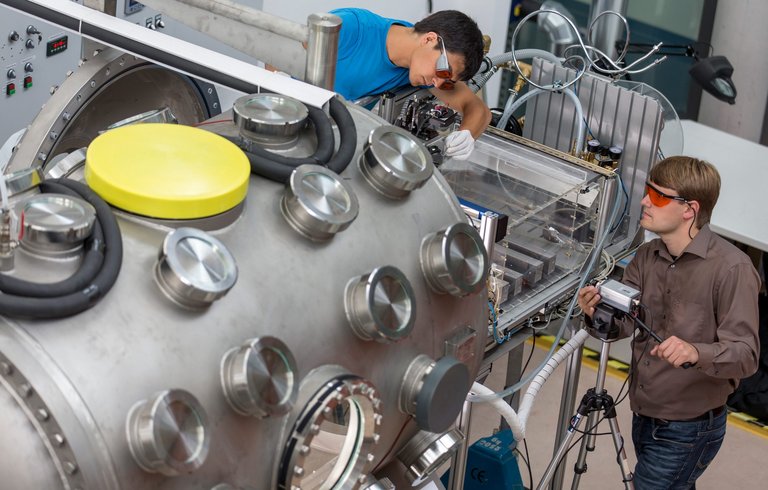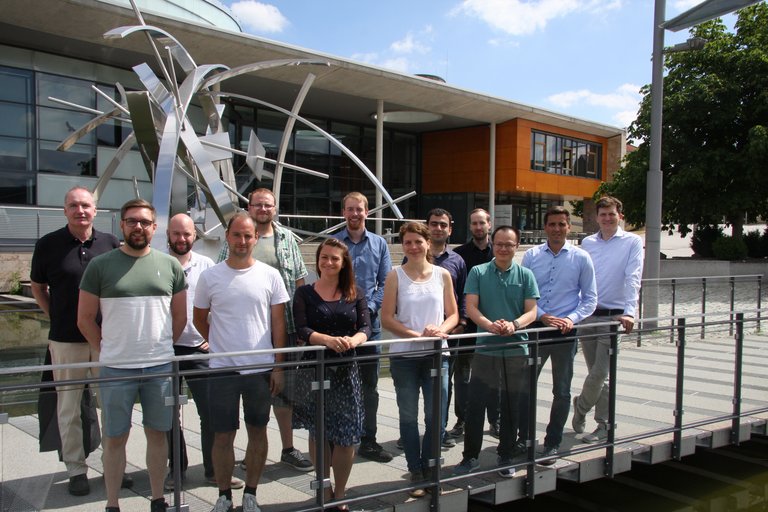What contribution can Technical Thermodynamics make to technical education for sustainable development? How can the concept of sustainability be explained using the basic laws of thermodynamics? And how can the study of convective flows and natural heat transport processes in the eponymous research group contribute in achieving the United Nations' sustainability goals? These questions were discussed by Prof. Christian Karcher from the Technical Thermodynamics Group during the Science Forum of TU Ilmenau.

With the 2030 Agenda, the global community has set itself 17 ambitious goals - the Sustainable Development Goals (SDGs). Sustainable Development Goal 7 is to ensure access to affordable and reliable energy for all. To this end, among other things, the share of renewable energy in the global energy mix has to be significantly increased and international cooperation has to be strengthened to facilitate access to research in the field of renewable energy and energy efficiency and to promote investment in clean energy. "In view of environmentally problematic aspects in the supply of energy and sharply rising consumer prices for energy due to shortage of resources, acting in accordance with sustainable principles is now more important than ever, especially in the energy sector," Prof. Karcher said:
Therefore, in particular, engineers are asked to design technical and energetic processes in such a way that they are both ecologically and economically as efficient and sustainable as possible. Technical Thermodynamics provides a guideline for this, so to speak, and is very well suited for conveying sustainable thoughts.
Thermodynamics is also referred to as general energy theory and is considered as a basic subject in many engineering courses, which intends to show so students the various ways in which different forms of energy can be converted. At the TU Ilmenau Technical thermodynamics is taught in the bachelor's degree programs in Mechanical Engineering and Automotive Engineering as well as in the master's degree programs in both Mechanical Engineering with focus on Thermofluiddynamics and Renewable Energy Technology. In the course of their study, based on the laws of thermodynamics, students will understand how different forms of energy are converted in technical processes and which unavoidable constraints are set in theses processes.
Statements on the sustainability of technical processes and their diverse applications
As examples of such processes, in his lecture Prof. Karcher mentioned the chemical conversion in a house heating by burning natural gas as well as mechanical conversion processes, as they are technically implemented for example in run-of-river, pumped storage and lift storage power plants:
In this way, students not only learn to assess the energy efficiency of technical processes, but also to judge the ecological and economical aspects in the process. In conclusion, the students will be qualified to make statements about the sustainability of these processes and their diverse applications, which in turn is the basis for the responsible use of energy as a resource.
For example, he says, resources are wasted in the sense of thermodynamics when hot exhaust gases, such as those produced in technical combustion processes, are conveniently simply disposed of into the atmosphere after having been used as a transport and transfer medium for process heat: "Due to the irreversible mixing that takes place in the process, the residual thermochemical exergy that is still abundantly available remains completely unused." In-depth expertise in technical thermodynamics is therefore of central importance for implementing sustainable approaches in applications, he said:
All future technical solution proposals in the context of the much-cited energy transition should be based on a fundamental understanding of thermodynamic relationships.
Making theory tangible with laboratory practice and field trips
In engineering study programs, however, students should not only learn the theory, but also be able to carry the lasting messages of thermodynamics into engineering applications. Prof. Karcher's plea is:
A comprehensive understanding of thermodynamic relationships can only be acquired by rooting experiential learning in the course of study through laboratory practice and field trips, as is already the case at the TU Ilmenau on a voluntary basis. Compulsory laboratory experiments and technical excursions would be useful instruments for making university engineering education in technical thermodynamics, which is predominantly theoretical and based on thought experiments, more application-oriented and even more attractive for students.
At the end of his presentation, Prof. Karcher used the example of a research project funded by the German Research Foundation DFG to show how the study of convective flow and natural heat transport processes can contribute to sustainable energy storage. The goal of the project is to conduct basic experimental and numerical investigations of flow and heat transport behavior in so-called Rayleigh-Bénard convection (RBC), which is influenced by the combined effects of thermal radiation and magnetic fields. The results of the project, which involves Dalian University of Technology, DLR Institute of Technical Thermodynamics and Helmholtz-Zentrum Dresden-Rossendorf as project partners, are expected to contribute to a better understanding of thermal energy systems operating at high temperatures and with electrically conductive fluids. With regard to relevant engineering applications, the correlations found are to be used, among other things, to avoid critical fluid mechanical and thermal states in high-temperature energy storage systems and liquid metal batteries.
Interested students can learn more about the topic at the #WissenschaftErklärt theme days. On February 8, 2023 at 3 p.m., Prof. Christian Karcher will use practical examples in his online lecture "From the steam engine to sustainable energy supply" to illustrate the state of the art in energy supply and the exciting issues currently being researched at TU Ilmenau's Technical Thermodynamics Group.
More information about the main research areas and the range of services offered by the group


